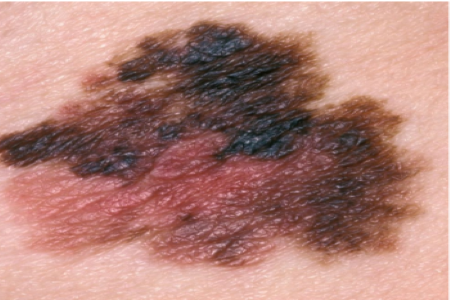Castle Biosciences, Inc.’s DecisionDx-Melanoma significantly improves risk stratification of patients with stage I melanoma compared to American Joint Committee on Cancer 8th Edition (AJCC8) staging, a new study shows.
DecisionDx-Melanoma classifies patients as having a low risk (Class 1A), intermediate risk (Class 1B/2A) or high risk (Class 2B) of tumor recurrence, metastasis and melanoma-specific mortality based on the patient’s tumor biology.
This multi-center study analyzed data from nearly 7,000 patients with stage I cutaneous melanoma to assess their five-year recurrence-free survival (RFS) and melanoma-specific survival (MSS) using the DecisionDx-Melanoma test. There were two cohorts of patients: a pooled cohort from previous studies (combined cohort, n=1,261) and a second, large, real-world cohort of unselected patients who received the DecisionDx-Melanoma test as part of their clinical care (patients diagnosed with cutaneous melanoma between 2013–2018 who were linked to outcomes data from the National Cancer Institute’s SEER Program registries, n=5,651). The combined cohort was evaluated for RFS and MSS, and the SEER cohort was evaluated for MSS.
In both cohorts, DecisionDx-Melanoma provided greater separation between patients with high- and low-risk test results than seen between AJCC8 stage IA and IB, demonstrating the ability of the test to provide improved risk stratification over staging.
Combined cohort
| Separation of risk | ||
| RFS stratification | DecisionDx-Melanoma test results | Class 1A (low risk) (97.3%) vs. Class 2B (high risk) (77.3%); p < 0.001 |
| AJCC8 staging | Stage IA (97.5%) vs. IB (89.3%); p < 0.001 | |
SEER cohort
| Separation of risk | ||
| MSS
stratification |
DecisionDx-Melanoma test results | Class 1A (low risk) (98.0%) vs. Class 2B (high risk) (92.3%); p < 0.001 |
| AJCC8 staging | Stage IA (97.6%) vs. stage IB (97.9%); p < 0.001 |
In the combined cohort, multivariable analysis showed that a DecisionDx-Melanoma Class 2B test result was the strongest predictor of recurrence in stage I cutaneous melanoma; similarly, in the SEER cohort, multivariable analysis indicated that a high-risk test result was the only significant predictor of melanoma-specific mortality in stage I patients.
“Relying on staging alone to determine a melanoma patient’s prognosis misses patients with aggressive tumor biology who may be at higher risk of recurrence, metastasis or death from their disease,” says Sebastian Podlipnik, MD, PhD, lead study author and dermatologist at the Hospital Clínic de Barcelona, Universitat de Barcelona in Spain, in a news release. “As supported by the data in this study, incorporating DecisionDx-Melanoma test results into clinical decision-making can help identify which patients with lower stage tumors may be at higher risk of disease progression and could benefit from more aggressive follow-up schedules and treatment plans to identify recurrence earlier when it has generally been shown to have better treatment outcomes.”


